|
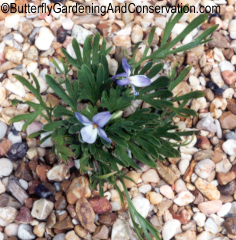 The Bird's Foot Violet is native to much of the eastern U.S. and part of Canada. However it is rare and/or threatened in some
areas due to prairie destruction.
The Bird's Foot Violet is native to much of the eastern U.S. and part of Canada. However it is rare and/or threatened in some
areas due to prairie destruction.
This violet grows to about 3 to 6 inches high. The leaves resemble a bird's foot.
Flowers come in 2 forms - one is lilac and white in color the other has two petals that are a deeper purple
(see pictures below). Blooms in the spring.
Bird's Foot Violets prefer full sun and somewhat dry, rocky or sandy, well-drained soil.
The seeds are ejected a few inches from the plant and are often carried off by ants which are attracted to the sugary
coating on the seeds.
Bird's Foot Violet is a Host Plant for the Regal Fritillary
Regal Fritillaries (Speyeria idalia) use this violet as a host plant. It is a very beautiful butterfly
that was once very common across the midwest and eastern U.S. but now is very rare due to habitat destruction -
or more specifically due to tall grass prairie destruction.
More Bird's Foot Violet Pictures
Light colored flowers:
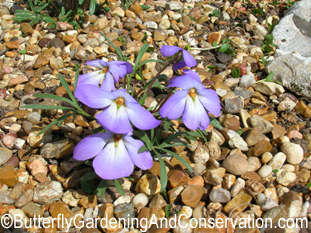
Light and dark colored flowers:
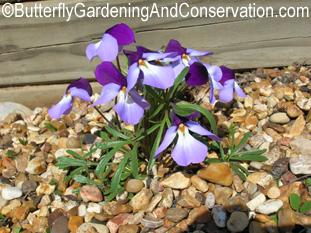
Close up of leaf:
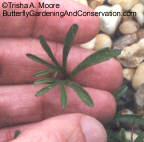 Picture showing pebbles I grow mine with:
Picture showing pebbles I grow mine with:
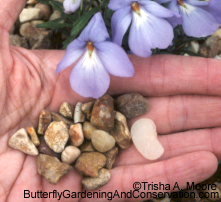
Another picture of one with two colored flowers:
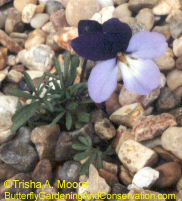
Where to buy Bird's Foot Violet
The only place I've found that sells it is
Hamilton Seeds and Wildflowers,
although there must be other places that sell it. But its doubtful that you will find it at a
typical nursery.
Growing Tips
I tried starting this plant from seed before but had no success. I recommend buying the plant.
They like somewhat sandy, dry soil.
|
Current status of this plant in my garden (last updated: 3/09)
|
Regal Fritillaries would be extremely unlikely to be found in this area, but I still like to grow a host
plant for them anyway. If nothing else, it opens an opportunity to educate people about the destruction
of tall grass prairies and how habitat destruction can result in species extinction.
I grow mine in a slightly raised bed that I filled with mixture of potting soil, sand and some small pebbles.
I then covered the top of the area with the small pebbles too, just to make it look nicer. I don't know that all of this is
necessary, but it seems to be working. Over the past few years that I've had mine I've lost only 2 out of 9 plants.
|
The Viola Family
The Viola family consists of herbs usually with colorful flowers. There are about 900 species worldwide.
Some species make flowers that don't open, but self pollinate.
Distribution
From the U. S. Department of Agriculture:
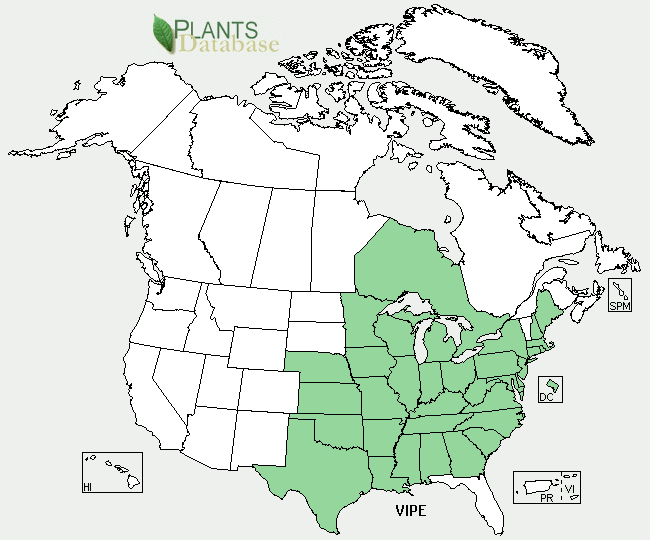
Classification
| Kingdom: | Plantae - Plants |
| Subkingdom: | Tracheobionta - Vascular plants |
| Superdivision: | Spermatophyta - Seed plants |
| Division: | Magnoliophyta - Flowering plants |
| Class: | Magnoliopsida - Dicotyledons |
| Subclass: | Dilleniidae |
| Order: | Violales |
| Family: | Violaceae – Violet family |
| Genus: | Viola L. – violet |
| Species: | Viola pedata L. – birdfoot violet |
Additional Information
Good information about Bird's Foot Violet can be found at the
Prairie Wildflowers of Illinois site.
Butterfly Gardening Home |
Butterfly Gardening Articles |
Butterfly Species |
Plants |
Butterfly and Gardening Shopping |
T-shirts |
Mugs |
Magnets |
Clocks |
Tote Bags |
Framed Tiles |
Notebooks |
Postcards |
Light Switch Covers |
Tile Coasters |
Calendars |
Butterfly Calendars |
Resources |
Contact |
Blog |
[old blog] |
© 2003 - 2025 ButterflyGardeningAndConservation.com
Today is: 29 December 2025, 3:27 pm |

